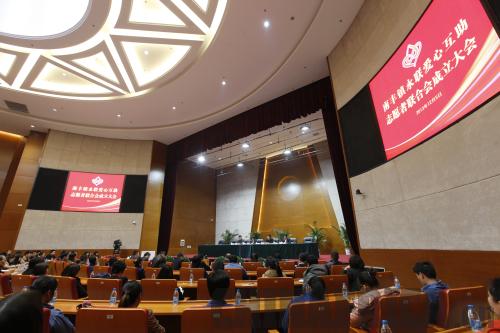| 
The imposing Farmer's Round Chamber is the seat of decision making in Yonglian Village
An unusual sight greets visitors to Yonglian, a village on the outskirts of Zhangjiagang City in east China's Jiangsu Province. In the village center stands an eye-catching, European-style building. Though at odds with its surroundings, it serves a very important purpose.
The building - Yonglian Village Hall - is China's first farmers' chamber, established by Wu Dongcai, Secretary of the CPC (Communist Party of China) Branch of Yonglian Village, where villagers can manage the village affairs in a democratic manner.
"Today, villagers manage village affairs in the chamber, which guarantees their decision-making right," Wu said. According to him, it has ushered in a new chapter in Yonglian's efforts to promote the rule of law in village governance.
The Genesis
Yonglian was established in 1970 with only 254 households and less than 800 mu (53.3 hectares) of farmland. It was once an administrative village in Zhangjiagang with the smallest number of residents and the weakest economy.
But over the years it has transformed from a barren stretch of muddy ground too insignificant to appear on the Jiangsu Province map to a village of national importance. The once impoverished village, through producing steel, is now home to more than 10,900 villagers and sprawls over 10.5 square km. In 2014, its disposable income reached 120 million yuan ($19.67 million), propelling it to the third place among 600,000 administrative villages nationwide in terms of economic aggregate.
But as residents' living standards improved, new issues emerged, such as compensation for land expropriation and housing relocation. Wu realized that with the village growing bigger, it would be impossible for the villagers' committee with just a few members to resolve all these problems. It was time to find a mechanism to ensure all villagers could participate in managing their village.
In 2012, after a visit to Germany, Wu set up the chamber for villagers to manage their own affairs, based on the European style of parliament. "People managing their own affairs in the hall will be a great help in building democracy at the grassroots level," he remarked.
The Fourth Plenary Session of the 18th CPC Central Committee in October 2014 pledged to further strengthen the rule of law in the country. This encouraged Wu in his efforts to promote grassroots democracy.
The round chamber, built with an investment of more than 40 million yuan ($6.5 million), has more than 200 seats and a round rostrum. There is a platform for speakers in the middle of the hall and villager representatives have free access to the podium. A large screen mounted on the exterior wall of the hall enables villagers to see congress proceedings live, which ensures that the decision-making procedures are transparent.
Since the chamber was built, the idea of being or having a trustworthy representative has struck a chord with the residents. Village representative Lu Weihong said elections take place every three years. Like the National People's Congress, China's national legislature, where the deputies are chosen from all provinces by a system of proportional representation, 250 villagers are proportionally elected as the village chamber's representatives from the 12 village blocks.
The Yonglian chamber holds its congress every six months to discuss major issues. At the congress, the committee delivers its work report on economic, political and cultural work in the past six months. Representatives voice the aspirations of residents at the congress.
"The final decisions are made by [vote] after discussions at the villagers' congress," Song Yongxiang, chief of Yonglian Economic Cooperation Bureau, told ChinAfrica. "This democratic process has the full support of villagers and ensures the chamber operates effectively."
Roundtable meetings
The village congress also has a 35-member council and the members are selected from 250 villager representatives. The council deals with the village's day-to-day problems through a roundtable meeting.
Farmer Xu Yunkai's case is an example. Xu filed a petition to the town-level and municipal governments over his repeated failures to secure a subsistence allowance. In September 2013, the council decided to convene a roundtable to deal with the matter. The meeting was attended by Xu, officials and lawyers from the Zhangjiagang City Judicial Department, and villager representatives.
According to village representative Lu, Xu refused to go to work more than 10 years ago. He and his wife grow vegetables in the village. Xu claimed they earned less than 3,000 yuan ($491) a year, which would qualify him for the national subsistence allowance. However, some representatives asked for an inquiry into his personal bank accounts to determine his real income. After a series of debates and the collection of evidence, Xu admitted he didn't meet the minimum standard and withdrew his application.
Officials and members of the judiciary from Zhangjiagang City are invited to attend each roundtable meeting as special representatives to promote an objective and fair attitude. The special representatives actively participate in the discussions, offering advices on dispute settlements to find the best solutions.
"The free and frank discussions cast light on many problems, which is crucial for managing the village affairs by locals themselves," said Wu Huifang, Deputy Secretary of Party Branch of Yonglian Village.
Yonglian Hall has aroused villagers' interest in getting involved in village management to a great extent. "The majority of people in this village are now more rational and sensible," said Shi Huiqin, head of the Office for Letters and Calls of Zhangjiagang's Nanfeng Town and a frequent attendee at the village meetings. "What is even more gratifying is that they [now] look to the law for help."
Wu has a postscript to add: "The chamber doesn't only help village cadres carry out their work, it also helps Yonglian's development."
|